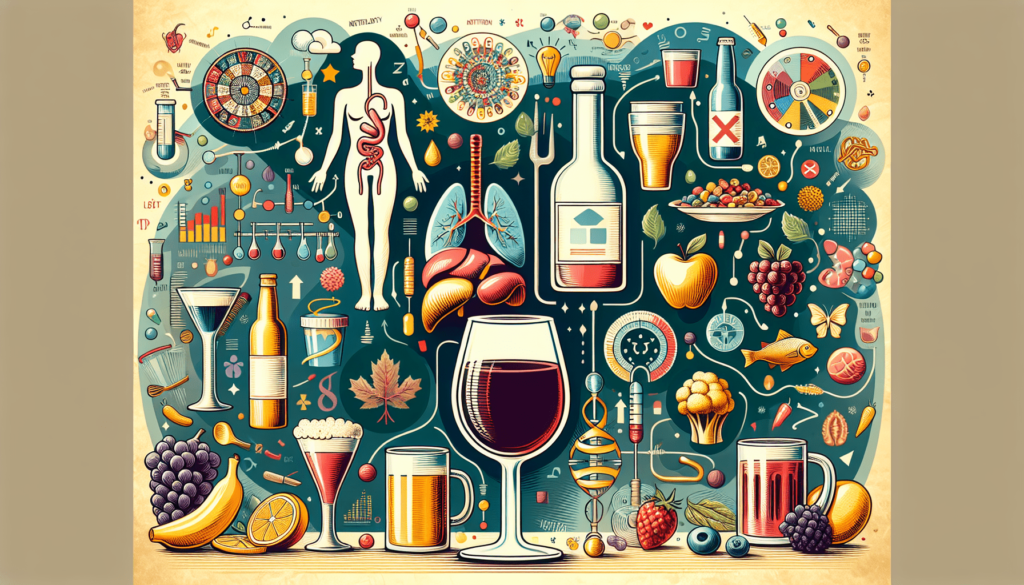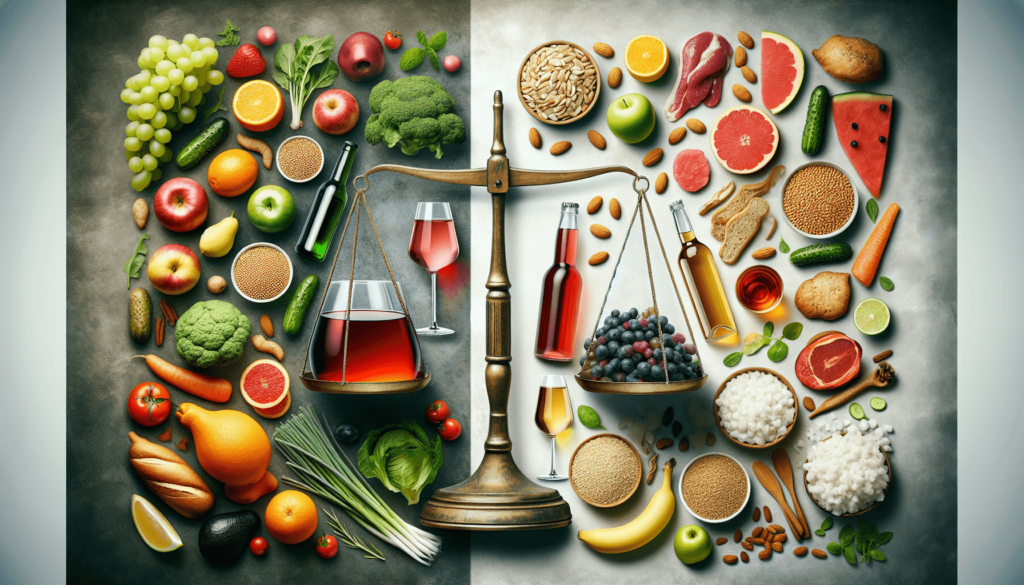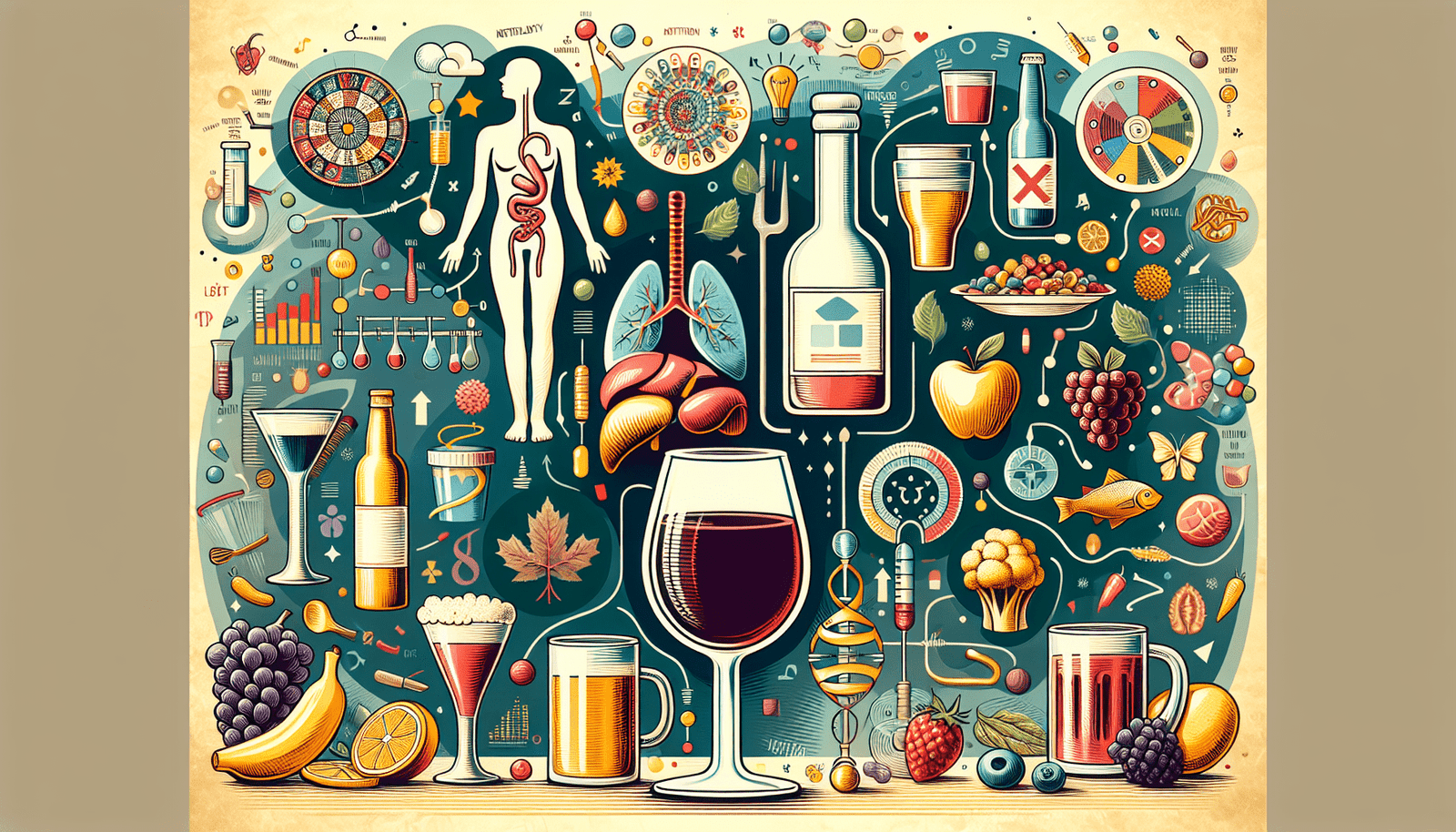In the world of health and wellness, there is often a lot of confusion surrounding the topic of alcohol and its impact on our nutrition. Many wonder if alcohol can fit into a balanced diet, while others are concerned about the potential negative effects on their overall health. In this article, we will explore the relationship between alcohol and nutrition, shedding light on the various health implications that alcohol consumption can have. Whether you enjoy an occasional cocktail or are curious about its effects, this article will provide you with a clearer understanding of how alcohol can impact your nutrition and well-being.
Alcohol and Its Effects on the Body
Alcohol consumption has become a common part of social gatherings and celebrations. While many people enjoy the occasional drink, it is important to understand the effects that alcohol can have on the body. From the way alcohol is absorbed in the body to its impact on various systems, let’s delve into the relationship between alcohol and our overall health.
How Alcohol is Absorbed in the Body
When you consume alcohol, it enters your bloodstream through the process of absorption. The majority of alcohol absorption occurs in the small intestine, where it is quickly and efficiently absorbed into the bloodstream. This is why you may experience the effects of alcohol relatively quickly after consuming a drink.
Metabolism of Alcohol
Once alcohol enters the bloodstream, it undergoes metabolism in the liver. The liver breaks down alcohol into acetaldehyde – a toxic substance that can cause damage to the body. Acetaldehyde is further broken down into acetic acid, which is then converted into carbon dioxide and water for elimination from the body.
Effects of Alcohol on the Liver
The liver plays a crucial role in metabolizing alcohol, but excessive alcohol consumption can have detrimental effects on this vital organ. Chronic alcohol abuse can lead to liver diseases such as fatty liver, alcoholic hepatitis, and ultimately, cirrhosis. These conditions can have serious implications for liver function and overall health.
Impact of Alcohol on the Brain
Alcohol has a profound impact on the brain, affecting various neurotransmitters and altering normal brain function. It acts as a central nervous system depressant, slowing down brain activity and impairing cognitive function. Short-term effects can include impaired judgment, decreased inhibitions, and difficulty with coordination. Long-term alcohol abuse can lead to serious neurological disorders such as Wernicke-Korsakoff syndrome.
Effects of Alcohol on the Digestive System
Alcohol consumption can also have significant effects on the digestive system. It can irritate the lining of the stomach, leading to inflammation and an increased risk of developing ulcers. Alcohol can also interfere with the proper absorption of nutrients, which can contribute to malnutrition and other related health problems. Additionally, excessive alcohol consumption can disrupt the normal functioning of the intestines, leading to issues like diarrhea and malabsorption.
Nutritional Components of Alcohol
Alcoholic beverages contain more than just alcohol; they also contain a variety of nutritional components that can impact our overall health. Let’s explore the different nutritional aspects of alcoholic drinks.
Calories in Alcoholic Beverages
One primary nutritional component of alcohol is its caloric content. Alcohol is high in calories and can contribute significantly to overall calorie intake. Each gram of alcohol contains approximately 7 calories, which is nearly double the calories in a gram of carbohydrates or protein. This high caloric density can easily lead to weight gain if alcohol is consumed excessively or regularly.
Carbohydrates and Sugar in Alcohol
Many alcoholic beverages, such as beer and sweet cocktails, contain carbohydrates and sugars. These carbohydrates can provide additional calories and contribute to the overall energy intake. It is important to be mindful of the carbohydrate content in alcoholic drinks, especially for individuals who are watching their carbohydrate intake or managing conditions like diabetes.
Proteins and Fats in Alcoholic Drinks
While alcohol itself does not contain significant amounts of proteins and fats, certain types of alcoholic beverages, such as creamy cocktails or liquors mixed with high-fat mixers, can contribute to the overall intake of these macronutrients. It is essential to be aware of the potential nutritional impact of the mixers or additives used in alcoholic drinks.
Vitamins and Minerals in Alcohol
Alcoholic beverages generally do not provide significant amounts of essential vitamins and minerals. In fact, excessive alcohol consumption can interfere with the body’s ability to absorb and utilize these essential nutrients. It is crucial to obtain vitamins and minerals from a well-balanced diet rather than relying on alcoholic beverages to meet these nutritional needs.

Alcohol’s Impact on Nutritional Intake
Alcohol consumption can have a significant impact on overall nutritional intake. Let’s explore how alcohol can lead to nutrient deficiencies and interfere with nutrient absorption.
Nutrient Deficiencies Due to Alcohol Consumption
Excessive alcohol consumption can lead to nutrient deficiencies in several ways. Firstly, alcohol can directly affect the body’s ability to absorb and utilize essential nutrients such as vitamins and minerals. Secondly, heavy drinking can displace nutrient-rich foods from the diet, leading to a lack of essential nutrients. Lastly, chronic alcohol abuse can impair liver function, which plays a crucial role in the metabolism and storage of nutrients in the body.
Alcohol’s Interference with Nutrient Absorption
Alcohol can interfere with the absorption and utilization of essential nutrients in the body. It can damage the lining of the intestines, reducing the surface area available for nutrient absorption. Additionally, alcohol can disrupt the normal processes of nutrient transport and metabolism, leading to deficiencies in vitamins and minerals.
Decreased Appetite and Poor Food Choices
One of the ways alcohol impacts nutritional intake is by decreasing appetite. Alcohol can suppress the appetite, leading to decreased food intake. Furthermore, when individuals do eat while under the influence of alcohol, they tend to make poor food choices. Late-night fast food runs or indulging in high-calorie, nutrient-poor snacks are common occurrences. These habits can contribute to an unbalanced and inadequate diet.
Alcohol’s Impact on Vitamin and Mineral Balance
Many vitamins and minerals play crucial roles in maintaining overall health and wellbeing. Excessive alcohol consumption can disrupt the balance of these essential nutrients in the body. Alcohol can deplete the body of certain vitamins, such as vitamin C and the B vitamins, leading to deficiencies and associated health problems. Proper nutrition and a balanced diet are essential to maintain adequate vitamin and mineral levels, especially in individuals who consume alcohol regularly.
Alcohol’s Role in Weight Gain and Obesity
Alcohol can have a significant impact on weight gain and obesity. Let’s explore the relationship between alcohol consumption and its effect on body weight.
Caloric Density of Alcohol
As mentioned earlier, alcohol is high in calories. It contains nearly double the calories per gram compared to carbohydrates and protein. Regular consumption of alcohol can lead to significant calorie intake, which can contribute to weight gain if it exceeds the body’s energy needs.
Effects of Alcohol on Hunger and Satiety
Alcohol can disrupt the body’s normal hunger and satiety cues, leading to increased food intake or poor appetite regulation. Some individuals may experience increased hunger after consuming alcohol, leading to overeating. On the other hand, alcohol can also reduce satiety and result in prolonged feelings of hunger, causing individuals to eat more than necessary.
Alcohol and Body Fat Accumulation
The excess calories consumed through alcohol can easily be stored as body fat if they are not utilized for energy. Furthermore, alcohol can promote fat storage by interfering with the body’s normal fat metabolism. Over time, regular alcohol consumption can contribute to increased body fat accumulation, leading to weight gain and potentially obesity.
Link between Alcohol and Abdominal Obesity
Abdominal obesity, characterized by excess fat accumulation around the waistline, is associated with an increased risk of various health conditions such as cardiovascular disease and type 2 diabetes. Research has shown a link between alcohol consumption and the development of abdominal obesity. Excessive alcohol intake, especially among men, can lead to increased waist circumference and abdominal fat deposition.

Alcohol’s Influence on Macronutrient Metabolism
Alcohol can have significant effects on the metabolism of macronutrients such as carbohydrates, proteins, and fats. Let’s dive into how alcohol impacts the metabolism of these essential nutrients.
Alcohol’s Effect on Carbohydrate Metabolism
When alcohol is consumed, the body prioritizes its metabolism over other macronutrients such as carbohydrates. This means that when alcohol is present in the system, carbohydrate metabolism slows down, potentially leading to an excess of unused carbohydrates being stored as fat. Alcohol can also impair the body’s ability to regulate blood sugar levels, which can have consequences for individuals with diabetes.
Alcohol’s Impact on Protein Metabolism
Protein metabolism can be affected by alcohol consumption in several ways. Firstly, alcohol can interfere with the absorption of amino acids, which are the building blocks of proteins. This can lead to reduced protein synthesis and muscle wasting. Secondly, excessive alcohol consumption can impair the liver’s ability to produce proteins, which are essential for various bodily functions. These disruptions to protein metabolism can have negative implications for overall health and wellbeing.
Alcohol’s Influence on Fat Metabolism
Alcohol consumption can interfere with the body’s normal fat metabolism processes. When alcohol is present in the body, fat burning is prioritized, leading to a reduced ability to metabolize and utilize dietary fats effectively. This can contribute to increased fat storage and hinder weight loss efforts. Additionally, excessive alcohol consumption can lead to the accumulation of unhealthy fats in the liver, contributing to the development of fatty liver disease.
Alcohol and Micronutrient Deficiencies
Micronutrients such as vitamins and minerals are essential for various bodily functions. Alcohol consumption can have detrimental effects on their absorption and utilization. Let’s explore the impact of alcohol on micronutrient deficiencies.
Alcohol’s Negative Impact on Vitamin Absorption
Alcohol consumption can impair the absorption and utilization of various vitamins. For example, excessive alcohol intake can interfere with the absorption of vitamin B12, which is crucial for nerve function and red blood cell production. Alcohol can also disrupt the metabolism of vitamin D, leading to deficiencies that can have implications for bone health and immune function. It is important to ensure adequate intake of these vitamins from dietary sources, especially if alcohol is regularly consumed.
Mineral Deficiencies Linked to Alcohol Consumption
Alcohol can lead to deficiencies in essential minerals, such as magnesium, zinc, and calcium, among others. Excessive alcohol consumption can impair the body’s ability to absorb and retain these minerals, leading to imbalances and associated health problems. For example, magnesium deficiency can result in muscle cramps and weakness, while zinc deficiency can impair immune function and wound healing. Adequate intake of these minerals through a well-balanced diet is crucial, especially for individuals who consume alcohol.
Effects of Alcohol on B Vitamins
B vitamins play vital roles in energy metabolism and various physiological processes. Heavy alcohol consumption can deplete the body of these essential B vitamins, leading to deficiencies. For example, thiamine (vitamin B1) deficiency is common among individuals with alcohol use disorder and can lead to neurological complications such as Wernicke-Korsakoff syndrome. Proper nutrition and supplementation may be necessary to prevent or correct these deficiencies in individuals who consume alcohol regularly.
Alcohol’s Influence on Vitamin D and Calcium
Vitamin D and calcium are essential for bone health and play vital roles in various physiological processes. Alcohol consumption can negatively impact the metabolism and utilization of these nutrients, leading to deficiencies. Vitamin D deficiency can result in weakened bones, while calcium deficiencies can contribute to conditions like osteoporosis. Adequate intake of vitamin D and calcium through dietary sources is crucial, especially for individuals who consume alcohol, to maintain optimal health.
Alcohol’s Impact on Hydration and Electrolyte Balance
Proper hydration and electrolyte balance are crucial for overall health and wellbeing. Alcohol consumption can disrupt these essential processes, leading to dehydration and imbalanced fluid levels.
Dehydration Caused by Alcohol
Alcohol is a diuretic, meaning it increases urine production and can lead to dehydration. When you consume alcohol, your body produces more urine than it would with an equivalent volume of water. This increase in urine production can lead to fluid loss and dehydration. It is important to stay adequately hydrated, especially when consuming alcohol, by drinking water alongside alcoholic beverages.
Effects of Alcohol on Electrolyte Levels
Electrolytes such as sodium, potassium, and magnesium are essential for maintaining proper fluid balance in the body. Alcohol consumption can disrupt the normal levels of these electrolytes, leading to imbalances. For example, alcohol can increase urine excretion of potassium, which is crucial for heart function and muscle contraction. Imbalances in electrolyte levels can have serious health implications and may require medical intervention to restore proper balance.
Link between Alcohol and Imbalanced Fluid Levels
Excessive alcohol consumption can have a direct impact on fluid levels in the body. Alcohol causes fluid loss through increased urine production, leading to dehydration. Additionally, alcohol can interfere with the body’s ability to properly regulate fluid balance, which can result in imbalances and associated health problems. It is essential to maintain adequate fluid levels, especially when consuming alcohol, by ensuring proper hydration and electrolyte intake.
Alcohol’s Effect on Nutrient Delivery to the Muscles
Muscles require essential nutrients to function optimally, including proteins for muscle repair and growth. Let’s explore how alcohol consumption can impact nutrient delivery to the muscles.
Alcohol’s Influence on Protein Synthesis
Protein synthesis is a crucial process for muscle repair and growth. Excessive alcohol consumption can interfere with protein synthesis, leading to impaired muscle recovery and growth. Alcohol can decrease the production of proteins necessary for muscle repair, while also increasing muscle breakdown. This can result in reduced muscle strength and delayed recovery from exercise.
Impact of Alcohol on Muscle Recovery
Muscle recovery is an essential part of any exercise program. Alcohol consumption can hinder the body’s ability to properly recover after exercise. Alcohol interferes with protein synthesis, which is necessary for repairing and rebuilding muscles after strenuous physical activity. Additionally, alcohol can impair sleep quality, which is crucial for optimal muscle recovery. It is important to prioritize rest, proper nutrition, and adequate hydration for optimal muscle recovery, especially when alcohol is consumed.
Effects of Alcohol on Exercise Performance
Alcohol consumption can have negative effects on exercise performance. Alcohol is a central nervous system depressant, which can impair coordination, balance, and reaction time. These impairments can increase the risk of injury during physical activity. Additionally, alcohol can lead to reduced endurance and stamina, making it more challenging to achieve optimal exercise performance. To maximize exercise performance, it is advisable to avoid alcohol consumption before engaging in physical activity.
Alcohol and Malnutrition
Alcoholism and chronic alcohol abuse can often lead to malnutrition. Let’s explore the relationship between alcohol and malnutrition, and the associated health implications.
Alcoholism and Malnutrition
Alcoholism, or alcohol use disorder, can have a profound impact on nutritional status. Individuals with alcoholism often prioritize alcohol consumption over food, leading to poor dietary choices and inadequate nutrient intake. Additionally, alcohol can impair nutrient absorption and metabolism, further exacerbating the risk of malnutrition. Chronic alcohol abuse can lead to wasting syndromes, such as alcoholic liver disease or alcoholic cardiomyopathy, which are characterized by severe malnutrition.
Symptoms of Alcohol-Related Malnutrition
Malnutrition resulting from alcohol abuse can have various symptoms and manifestations. Individuals may experience weight loss, muscle wasting, weakness, and fatigue. Deficiencies in vitamins and minerals can lead to symptoms such as impaired immune function, poor wound healing, and neurological complications. Identifying and addressing alcohol-related malnutrition is crucial for restoring health and improving outcomes in individuals struggling with alcohol use disorder.
Relationship between Alcohol and Wernicke-Korsakoff Syndrome
Wernicke-Korsakoff syndrome is a neurological disorder often associated with chronic alcohol abuse. It is caused by thiamine (vitamin B1) deficiency and can result in cognitive impairment, memory loss, and difficulty with coordination. The disorder can have severe implications for overall brain function and quality of life. Thiamine supplementation, along with comprehensive medical and nutritional support, is crucial in the management of Wernicke-Korsakoff syndrome.
Tips for Balancing Alcohol and Nutrition
While moderate alcohol consumption can be enjoyed as part of a balanced lifestyle, it is important to practice mindfulness and make informed decisions about alcohol consumption. Here are some tips for balancing alcohol and nutrition:
Moderate Alcohol Consumption Guidelines
Follow the guidelines for moderate alcohol consumption, which state that men should consume no more than 2 standard drinks per day, and women should consume no more than 1 standard drink per day. It is important to note that these guidelines may vary depending on individual health conditions or medications. It is always advisable to consult with a healthcare professional when determining safe alcohol consumption levels.
Choosing Nutrient-Dense Alcoholic Beverages
When selecting alcoholic beverages, opt for options that are lower in calories and provide some nutritional value. For example, red wine contains antioxidants like resveratrol, while spirits mixed with sugar-free mixers can be lower in calories compared to sugary cocktails. Be mindful of added sugars and opt for drinks that are lower in added sugars and carbohydrates.
Smart Food Choices to Accompany Alcohol
When enjoying alcoholic beverages, make smart food choices to accompany them. Incorporate nutrient-rich foods such as fruits, vegetables, lean proteins, and whole grains into your meals and snacks. These foods can provide essential vitamins, minerals, and fiber to help balance out the impact of alcohol on your nutritional intake.
Supplementation for Alcohol-Related Nutrient Deficiencies
Individuals who consume alcohol regularly or have a history of heavy alcohol use may benefit from supplementation to address nutrient deficiencies. Work with a healthcare professional to determine any specific deficiencies and develop a personalized supplementation plan. It is important to remember that supplements should complement a well-balanced diet and not serve as a replacement for proper nutrition.
In conclusion, understanding the health implications of alcohol consumption is crucial for maintaining overall wellbeing. From its effects on nutrient absorption and metabolism to the impact on various body systems, it is important to approach alcohol consumption with moderation and awareness. By making informed choices, practicing mindfulness, and prioritizing proper nutrition, you can strike a balance between enjoying alcohol and maintaining optimal health.

